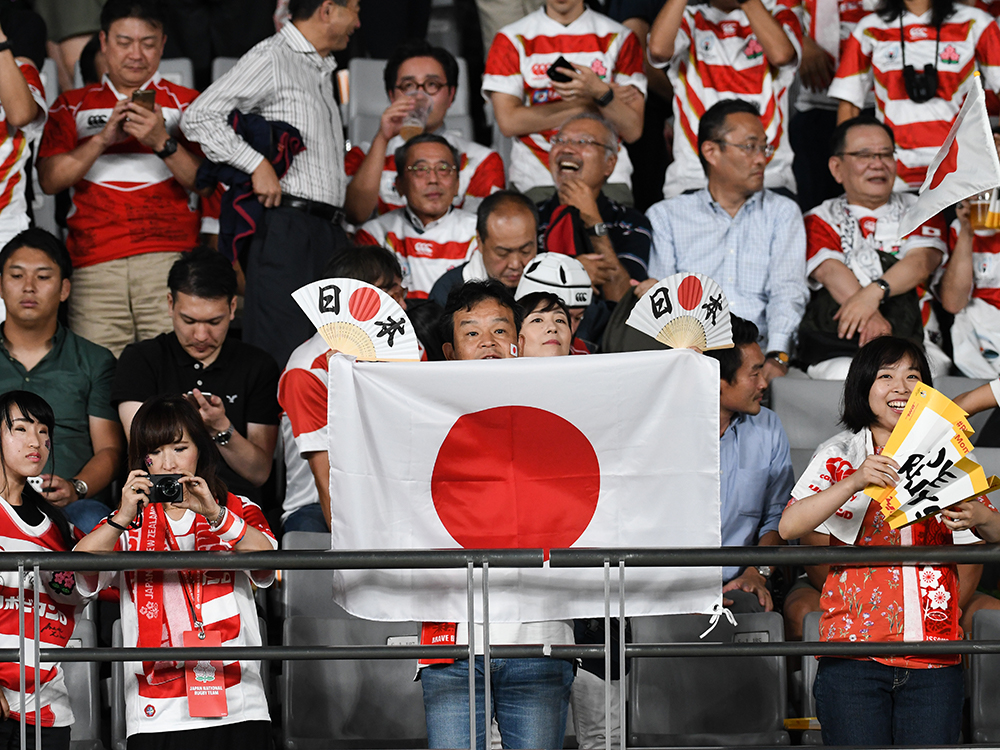World Rugby announced on March 9 that despite the challenging time-zone for participating nations, Rugby World Cup 2019 hosted by Japan was the most-watched rugby event ever.
From Japan’s opening victory on September 20 to South Africa’s rampant World Cup final victory over England on November 2, rugby fans watched international rugby of the highest order, a host nation shock the world as it stormed into a first ever World Cup quarter-final and a record numbers of traveling fans.
Record Viewership for World Rugby
World Rugby reported that more than 857 million people around the world watched the action via World Rugby’s network of rights-holding broadcast partners, an increase of 26 percent from the previous tournament held in England.
Asia’s first Rugby World Cup saw cumulative live audience grow from 479 million in 2015 to 501 million in 2019 – a 5 percent increase – despite the time difference to the traditionally dominant rugby broadcast markets of France and the UK.
Japan 2019’s audience growth was driven by the Asian market and in particular Japan, where the host’s performance captured hearts and smashes domestic market broadcast record.
RWC 2019 Final Sets Records
South Africa’s triumph over England was the most watched Rugby World Cup final ever with an average live audience of 44.9 million fans watching the Springboks prevail.
That represented an 83 percent increase on the live television audience for the final at Twickenham four years previously, while the total viewing figure was up by 63 percent to 51.3 million.
Interest in the UK and South Africa was high, and a combined 16.7 million people across the two countries watched the game back home on Saturday morning – more than double the figures achieved in those markets in 2015.
Japan Emerges as Rugby’s Newest Broadcast Market
Japan came into the tournament as rank outsiders. After decimating Ireland in Shizuoka, Japan went on to top the pool in emphatic fashion. It flipped the script of the Rugby World Cup 2019, and it is not surprising that Japan contributed just over half of all global viewing.
In Japan, a total cumulative audience of 425 million watched the games, more than five times the Japanese viewership for England 2015.
The most watched match on Japanese TV was the Brave Blossoms’ epic Pool A showdown with Scotland in Yokohama.
Japan’s quarter-final clinching victory, which went ahead just hours after Typhoon Hagibis had passed through the country, was watched by a domestic peak record rugby TV audience of 54.8 million – more than the FIFA 2002 World Cup final.
Japan also recorded the highest viewing figures for the Rugby World Cup final, as a live average of 17.2 million fans watched South Africa lift the Webb Ellis Cup for the third time.
Those impressive figures helped to swell the global cumulative viewing figures for the tournament, which grew from 679 million four years ago to 851 million in 2019. That represented an increase of 26 percent, or 172 million viewers.
Viewers outside of Europe represented a highest-ever 71 percent share of the total TV audience, nearly double the share of audience achieved at England 2015.
Growing Interest in Rugby
With Rugby World Cup a proven inspirer of new fans, 52 per cent of people who followed the tournament in emerging markets did so for the first time.
Japan was not the only market that experienced impressive growth during RWC 2019. Driven by a move to free-to-air broadcast, Germany became the seventh highest viewing territory globally with 10.82 million cumulative viewers tuning in.
That put Germany ahead of Italy and Ireland in terms of cumulative viewers and contributed to a rise in the cumulative audience of more than 55 per cent across German-speaking European countries.
RWC 2019 also reached new audiences in south-east Asia, propelled by impressive growth in Thailand, the Philippines, Malaysia and Vietnam – which all placed in the top 20 TV markets globally – cumulative viewing figures and increased from a base of less than one million to 20.5 million.
“These exceptional broadcast figures reaffirm our belief that Rugby World Cup 2019 in Japan will be remembered as one of the great, if not the greatest of all Rugby World Cups,” said World Rugby Chairman Sir Bill Beaumont in a released statement. “Overall audience growth is just one part of the story. It is particularly pleasing for the future development of the sport that Rugby World Cup 2019 broadcast success was driven by younger people in emerging markets such as India, Germany and across Asia, while Japan is now a major broadcast market for rugby – generating a sustainable audience legacy for the sport.”
Rugby in Japan
Japan’s legacy as RWC host country will endure but there is a question as to how will rugby endure as a professional sport in Japan.
Coming on the heals of the arrest of Hino Red Dolphins forward Joel Everson on suspicion of drug use, as reported by The Japan Times, the Japan Top League currently suspended play for the rest of March to conduct a full investigation into drug use across the league. A two-week break was already in place as a precaution due to the novel coronavirus outbreak.
Meanwhile, The Sunwolves, Japan’s foray into the Super Rugby Championship, are playing out their final season as the governing body SANZAAR notified the team last year that they will no longer participate in Super Rugby from 2021.
Japan’s national team, the Brave Blossoms, are currently scheduled to take on Wales in a test match on June 27, 2020, at Shizuoka Stadium ECOPA. If the Brave Blossoms bring the same level of energy and intensity they displayed during Rugby World Cup 2019, rugby’s popularity in Japan could continue to grow.
Feature image: Faiz Azizan / Shutterstock.com









